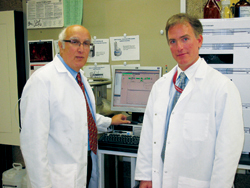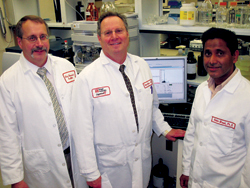Stimulus
|
The nation’s economic stimulus package has provided a significant boost to research, and Temple has benefited through the acquisition of more than $11 million in funding — including three highly competitive NIH challenge grants. Last month, President Barack Obama made a visit to the National Institutes of Health to emphasize the amount of funding that has been made available to spur biomedical and scientific research through the American Recovery and Reinvestment Act (ARRA) of 2009. After years of flat funding, NIH has received some $10 billion through the economic stimulus package passed by the Congress earlier this year. Other funding agencies, such as the National Science Foundation, have also seen an increase in the amount of funding available for research projects. |
 Preston M. Moretz / Temple University
Magid Abou-Gharbia (left), associate dean and director of the Moulder Center for Drug Discovery Research in the School of Pharmacy, is a co-investigator with pharmaceutical science associate professor Scott Rawls (right) on one of two NIH RC1 Challenge Grants awarded to Temple..
|
|
“There’s a lot of research funding that has been put on the table through ARRA,” said Robert Gage, director of sponsored research programs in Temple’s Research Administration Office. “Clearly, these dollars would not have been made available in as short a time as we’ve seen without the government’s stimulus funding.” Since late spring, Temple research faculty have submitted more than 225 grant proposals to NIH, NSF and other such agencies for funding that’s now being made available through ARRA. As of the end of September, 34 awards totaling more than $11 million had been made to Temple researchers to support new projects, existing projects, and to purchase new research equipment. Research faculty in Temple’s School of Medicine, School of Pharmacy, College of Science and Technology and College of Education are among those who have been awarded grants from ARRA money. “I think Temple has been doing very well in getting ARRA funding, as evidenced by the fact that we have recently been awarded two of the NIH RC1 Challenge Grants and a RC2 Challenge Grant,” said Gage. He pointed out that of 840 NIH RC1 Grants awarded nationally from more than 20,000 grant submissions, Temple received two. “The competition has been very steep, involving virtually every research institution in the country,” he said. The RC1 Challenge Grants have been awarded to Scott Rawls in pharmaceutical science and Keith Latham of the Fels Institute for Cancer Research and Molecular Biology. The RC2 Challenge was awarded to Steven Kelsen in pulmonary and critical care medicine and Salim Merali in biochemistry. “We are very excited about receiving this NIH RC1 Challenge grant,” said Magid Abou-Gharbia, associate dean and director of the Moulder Center for Drug Discovery Research in Temple’s School of Pharmacy, who is a co-investigator on the Rawls’ grant along with Sarah Ward and Bob Raffa from the department of pharmaceutical sciences. Abou-Gharbia said the grant, which will provide $955,749 over two years, will build on previous work done by Rawls with beta-lactam antibiotics. Under the grant, the researchers will synthesize novel chemical probes which could shed light on the action mechanisms of these antibiotics to determine if they could be drug candidates for treating substance abuse and neurodegenerative diseases. |
|
 Preston M. Moretz / Temple University
(L-R) Keith Latham, professor in the Fels Institute for Cancer Research and Molecular Biology received an NIH RC1 Challenge Grant, while Steven Kelsen (center), professor in pulmonary and critical care medicine, and Salim Merali, associate professor in biochemistry and director of the School of Medicine’s proteomics core facility, are co-principle investigators on an RC2 Challenge Grant
|
Merali, director of the School of Medicine’s proteomics core facility and principle investigator with Kelsen on the RC2 Challenge Grant, said they were happy to be receiving the funding since the competition level was more difficult than with the standard funding process. “Obviously, without the stimulus money, it would be very hard to get grants and the money to do this really important work,” he said about the two-year, $1.5 million grant. “As researchers, we are happy to have this type of funding available to us an option. The ARRA funding is something that is very short term, but will have a big impact in the long term through the success of our work.” |
|
Under the grant, Merali and Kelsen, along with Gerard Criner, chief of pulmonary and critical care medicine, and Zoran Obradovic, director of the Center for Information Science and Technology, will be using proteomics technology to identify cell proteins that could be used as biomarkers for chronic obstructive pulmonary disease (COPD). Latham’s grant will pursue the identification of factors in mammalian eggs that are responsible for nuclear reprogramming. The identification of these factors could improve the success in cloning animals for agricultural, biopharmaceutical, and species conservation purposes, as well as offer new methods for the production of therapeutically useful stem cells to be used for treating trauma and degenerative diseases. Together, the three NIH Challenge Grants account for nearly $3.5 million of Temple’s stimulus funds. “The funding through ARRA represents dollars that otherwise wouldn’t have been available this year,” said Gage. “We’ve received a couple of instrumentation awards, for example, that we probably wouldn’t have received this year without the stimulus money.” Gage also said that some of the stimulus money is being used for proposals that were submitted last year and deemed fundable, but that were not supported due to lack of funds. “NSF is now going back and funding them with these stimulus dollars,” he said. “That’s been a real positive for Temple, as well as for other research institutions.” |
|